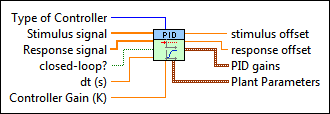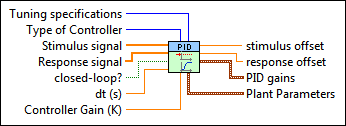 |
Ziegler-Nichols Speed specifies the desired response performance of the PID parameters.
| 0 | Fast—(Default) Specifies a fast response performance. Faster response generally results in a smaller rise time. | | 1 | Normal—Specifies a normal response performance. | | 2 | Slow—Specifies a slow response performance. Slower response generally results in less overshoot. |
|
 |
Type of Controller specifies which parameters to return as the PID gains.
| 0 | P—(Default) Specifies to return only the proportional parameters. | | 1 | PI—Specifies to return the proportional and integral parameters. | | 2 | PID—Specifies to return the proportional, integral, and derivative parameters. |
|
 |
Stimulus signal specifies an array that represents the stimulus signal.
|
 |
Response signal specifies an array that represents the response signal.
|
 |
closed-loop? specifies whether the system is a closed-loop system. If you set closed-loop? to TRUE, this VI estimates open-loop parameter values based on the closed-loop values it identifies from the input signals.
|
 |
dt (s) specifies the�interval, in seconds, at which this VI is called. If dt (s) is less than or equal to zero, this VI uses an internal timer with a one millisecond resolution. The default is 0.
|
 |
Controller Gain (K) specifies an initial value for the controller gain, which this VI uses to calculate the integral time (Ti, min) component of PID gains. The default is 0.
|
 |
stimulus operating point returns the calculated stimulus offset for the plant.
|
 |
response operating point returns the calculated response offset for the plant.
|
 |
PID gains returns the calculated PID gains values for the plant.
 |
proportional gain (Kc) returns the proportional gain of the controller.
|
 |
integral time (Ti, min) returns the integral time in minutes.
|
 |
derivative time (Td, min) returns the derivative time in minutes.
|
|
 |
Plant Parameters returns the calculated gain, time constant, and dead time of the plant.
 |
Plant Gain (K) returns the calculated process gain (K).
|
 |
Time Constant (T) returns the calculated time constant (T), in seconds.
|
 |
Dead Time (L) returns the calculated dead time (L), in seconds.
|
|
 |
Ziegler-Nichols Speed specifies the desired response performance of the PID parameters.
| 0 | Fast—(Default) Specifies a fast response performance. Faster response generally results in a smaller rise time. | | 1 | Normal—Specifies a normal response performance. | | 2 | Slow—Specifies a slow response performance. Slower response generally results in less overshoot. |
|
 |
Type of Controller specifies which parameters to return as the PID gains.
| 0 | P—(Default) Specifies to return only the proportional parameters. | | 1 | PI—Specifies to return the proportional and integral parameters. | | 2 | PID—Specifies to return the proportional, integral, and derivative parameters. |
|
 |
Stimulus signal specifies an array that represents the stimulus signal.
|
 |
Response signal specifies an array that represents the response signal.
|
 |
closed-loop? specifies whether the system is a closed-loop system. If you set closed-loop? to TRUE, this VI estimates open-loop parameter values based on the closed-loop values it identifies from the input signals.
|
 |
dt (s) specifies the�interval, in seconds, at which this VI is called. If dt (s) is less than or equal to zero, this VI uses an internal timer with a one millisecond resolution. The default is 0.
|
 |
Controller Gain (K) specifies an initial value for the controller gain, which this VI uses to calculate the integral time (Ti, min) component of PID gains. The default is 0.
|
 |
stimulus operating point returns the calculated stimulus offset for the plant.
|
 |
response operating point returns the calculated response offset for the plant.
|
 |
PID gains returns the calculated PID gains values for the plant.
 |
proportional gain (Kc) returns the proportional gain of the controller.
|
 |
integral time (Ti, min) returns the integral time in minutes.
|
 |
derivative time (Td, min) returns the derivative time in minutes.
|
|
 |
Plant Parameters returns the calculated gain, time constant, and dead time of the plant.
 |
Plant Gain (K) returns the calculated process gain (K).
|
 |
Time Constant (T) returns the calculated time constant (T), in seconds.
|
 |
Dead Time (L) returns the calculated dead time (L), in seconds.
|
|
 |
Type of Controller specifies which parameters to return as the PID gains.
| 0 | P—(Default) Specifies to return only the proportional parameters. | | 1 | PI—Specifies to return the proportional and integral parameters. | | 2 | PID—Specifies to return the proportional, integral, and derivative parameters. |
|
 |
Stimulus signal specifies an array that represents the stimulus signal.
|
 |
Response signal specifies an array that represents the response signal.
|
 |
closed-loop? specifies whether the system is a closed-loop system. If you set closed-loop? to TRUE, this VI estimates open-loop parameter values based on the closed-loop values it identifies from the input signals.
|
 |
dt (s) specifies the�interval, in seconds, at which this VI is called. If dt (s) is less than or equal to zero, this VI uses an internal timer with a one millisecond resolution. The default is 0.
|
 |
Controller Gain (K) specifies an initial value for the controller gain, which this VI uses to calculate the integral time (Ti, min) component of PID gains. The default is 0.
|
 |
stimulus offset returns the calculated stimulus offset for the plant.
|
 |
response offset returns the calculated response offset for the plant.
|
 |
PID gains returns the calculated PID gains values for the plant.
 |
proportional gain (Kc) returns the proportional gain of the controller.
|
 |
integral time (Ti, min) returns the integral time in minutes.
|
 |
derivative time (Td, min) returns the derivative time in minutes.
|
|
 |
Plant Parameters returns the calculated gain, time constant, and dead time of the plant.
 |
Plant Gain (K) returns the calculated process gain (K).
|
 |
Time Constant (T) returns the calculated time constant (T), in seconds.
|
 |
Dead Time (L) returns the calculated dead time (L), in seconds.
|
|
 |
Tuning specifications specifies which formula to use to convert the model to PID parameters. This input provides formulas for 0% and 20% overshoot.
| 0 | Regulator - 0% | | 1 | Regulator - 20% | | 2 | Servo - 0% | | 3 | Servo - 20% |
|
 |
Type of Controller specifies which parameters to return as the PID gains.
| 0 | P—(Default) Specifies to return only the proportional parameters. | | 1 | PI—Specifies to return the proportional and integral parameters. | | 2 | PID—Specifies to return the proportional, integral, and derivative parameters. |
|
 |
Stimulus signal specifies an array that represents the stimulus signal.
|
 |
Response signal specifies an array that represents the response signal.
|
 |
closed-loop? specifies whether the system is a closed-loop system. If you set closed-loop? to TRUE, this VI estimates open-loop parameter values based on the closed-loop values it identifies from the input signals.
|
 |
dt (s) specifies the�interval, in seconds, at which this VI is called. If dt (s) is less than or equal to zero, this VI uses an internal timer with a one millisecond resolution. The default is 0.
|
 |
Controller Gain (K) specifies an initial value for the controller gain, which this VI uses to calculate the integral time (Ti, min) component of PID gains. The default is 0.
|
 |
stimulus offset returns the calculated stimulus offset for the plant.
|
 |
response offset returns the calculated response offset for the plant.
|
 |
PID gains returns the calculated PID gains values for the plant.
 |
proportional gain (Kc) returns the proportional gain of the controller.
|
 |
integral time (Ti, min) returns the integral time in minutes.
|
 |
derivative time (Td, min) returns the derivative time in minutes.
|
|
 |
Plant Parameters returns the calculated gain, time constant, and dead time of the plant.
 |
Plant Gain (K) returns the calculated process gain (K).
|
 |
Time Constant (T) returns the calculated time constant (T), in seconds.
|
 |
Dead Time (L) returns the calculated dead time (L), in seconds.
|
|
 |
Desired Time Constant (tau_c) specifies a time constant value at which you want the system to perform after you close the loop. This VI uses this value to adjust the PID gains according to the internal model control method and as appropriate for a first-order model with delay.
|
 |
Type of Controller specifies which parameters to return as the PID gains.
| 0 | P—(Default) Specifies to return only the proportional parameters. | | 1 | PI—Specifies to return the proportional and integral parameters. | | 2 | PID—Specifies to return the proportional, integral, and derivative parameters. |
|
 |
Stimulus signal specifies an array that represents the stimulus signal.
|
 |
Response signal specifies an array that represents the response signal.
|
 |
closed-loop? specifies whether the system is a closed-loop system. If you set closed-loop? to TRUE, this VI estimates open-loop parameter values based on the closed-loop values it identifies from the input signals.
|
 |
dt (s) specifies the�interval, in seconds, at which this VI is called. If dt (s) is less than or equal to zero, this VI uses an internal timer with a one millisecond resolution. The default is 0.
|
 |
Controller Gain (K) specifies an initial value for the controller gain, which this VI uses to calculate the integral time (Ti, min) component of PID gains. The default is 0.
|
 |
stimulus offset returns the calculated stimulus offset for the plant.
|
 |
response offset returns the calculated response offset for the plant.
|
 |
PID gains returns the calculated PID gains values for the plant.
 |
proportional gain (Kc) returns the proportional gain of the controller.
|
 |
integral time (Ti, min) returns the integral time in minutes.
|
 |
derivative time (Td, min) returns the derivative time in minutes.
|
|
 |
Plant Parameters returns the calculated gain, time constant, and dead time of the plant.
 |
Plant Gain (K) returns the calculated process gain (K).
|
 |
Time Constant (T) returns the calculated time constant (T), in seconds.
|
 |
Dead Time (L) returns the calculated dead time (L), in seconds.
|
|
 Add to the block diagram
Add to the block diagram Find on the palette
Find on the palette










